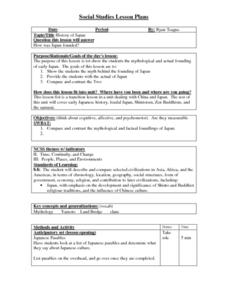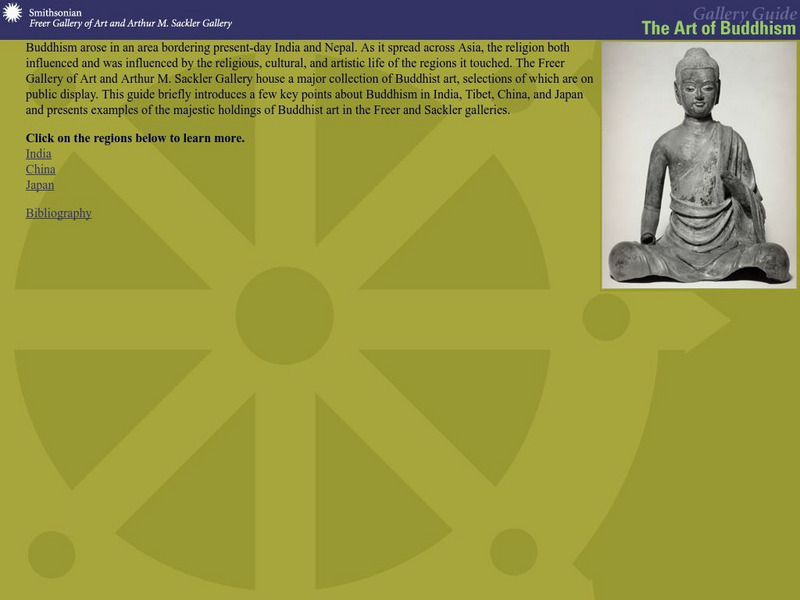Curated OER
Bodhidharma/Daruma Doll Lesson Plan
Students study Japanese Daruma dolls and the Legend of Bodhidharma. They create their own Daruma Dolls.
Curated OER
Zhou Dynasty
Students research the contributions of the Zho Dynasty. They identify the Mandate of Heaven, and the growth of the economy under the Zhou. They research the history of the discovery of silk and its role as an export. Finally, they...
Curated OER
Creative Writing and Analysis
Students read and analyze poems by Li Po and Wang Wei. They answer discussion questions, identify the elements of the poems, examine and discuss Chinese landscape paintings, write an original poem, and write a comparison/contrast essay.
Curated OER
History of Japan
Students research the mythological and factual founding of early Japan. They compare and contrast the two accounts. As an assessment activity, they fill out a chart that compares and contrasts the facts and myths surrounding Japanese...
Khan Academy
Khan Academy: Buddhism in Japan
Buddhism was officially transmitted to Japan in 525, when the monarch of the Korean kingdom of Baekje sent a mission to Japan with gifts, including an image of the Buddha, several ritual objects, and sacred texts. Buddhism's journey from...
Other
Silk Road Foundation: Buddhism and Its Spread Along the Silk Road
A comprehensive history of the development of Buddhism in India that also addresses its spread into China via the Silk Road, reaching its height during the Sui Dynasty.
The Field Museum
Field Museum: Exhibits: Splendors of China's Forbidden City: Emperor Qianlong
Artifacts reveal much about the Forbidden City, buried deep inside Beijing, and the life and reign of Chinese Emperor Qianlong, born in the Forbidden City and ruler from the mid- to late-eighteenth century. An online companion to a past...
Khan Academy
Khan Academy: Longmen Caves, Luoyang
Worship and power struggles, enlightenment and suicide-the 2300 caves and niches filled with Buddhist art at Longmen in China has witnessed it all.The steep limestone cliffs extend for almost a mile and contain approximately 110,000...
Khan Academy
Khan Academy: Introduction to Tibetan Buddhism
Buddhism was introduced into Tibet from India and China beginning in the 600s. Over the succeeding centuries, Buddhism became the dominant cultural form in Tibet, exerting a powerful influence not only over religion, but also over...
Khan Academy
Khan Academy: Introduction to Korean Buddhism
Buddhism became the official religion of one of Korea's early kingdoms in 372, after a priest arrived from China with Buddhist images and scriptures. From the time of its introduction it had the enthusiastic support of the rulers and the...
Internet History Sourcebooks Project
Fordham University: East Asian History Sourcebook: East Asian History Sourcebook
Fordham University, known for its excellent primary historical resources in English translation, provides one for Chinese, Japanese, Korean and Vietnamese history.
Smithsonian Institution
Freer | Sackler Galleries: Gallery Guide: The Art of Buddhism
An examination of the aesthetic tradition of Buddhist art in India, China, and Japan, with examples pulled from the Smithsonian galleries devoted to the art of Asia.
Curated OER
Etc: Maps Etc: Ethnolinguistic Groups of China, 1971
" Ethnolinguistic Groups - Almost all inhabitants of mainland China are of Mongoloid stock, and ethnic distinctions in the country are largely linguistic rather than racial. The Han comprise nearly 95 percent of the population; the...
Wikimedia
Wikipedia: Vajrayana
An article on Vajrayana, one of the three Buddhist routes to enlightenment. The article includes the history of Vajrayana and its teachings, as well as information about its development in places beyond India, such as China, Japan, and...
Curated OER
Unesco: China: Site of Xanadu
North of the Great Wall, the Site of Xanadu encompasses the remains of Kublai Khan’s legendary capital city, designed by the Mongol ruler’s Chinese advisor Liu Bingzhdong in 1256. Over a surface area of 25,000 ha, the site was a unique...
Curated OER
Unesco: China: Historic Ensemble of the Potala Palace, Lhasa
The Potala Palace, winter palace of the Dalai Lama since the 7th century, symbolizes Tibetan Buddhism and its central role in the traditional administration of Tibet. The complex, comprising the White and Red Palaces with their ancillary...
Curated OER
Unesco: Japan: Buddhist Monuments in the Horyu Ji Area
There are around 48 Buddhist monuments in the Horyu-ji area, in Nara Prefecture. Several date from the late 7th or early 8th century, making them some of the oldest surviving wooden buildings in the world. These masterpieces of wooden...















